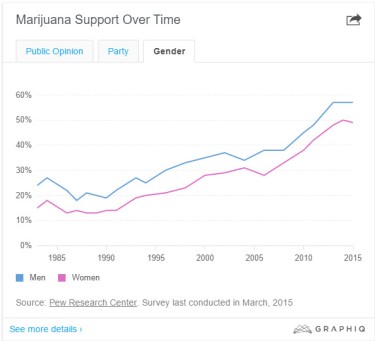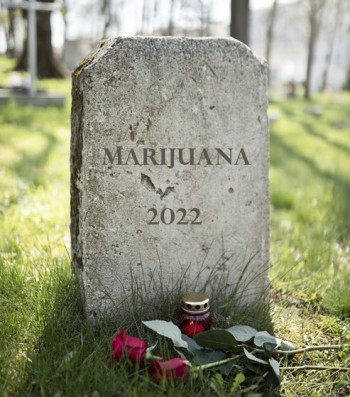
With only two exceptions: those who attend weekly church services and older conservatives aged 50+, nearly every demographic, spanning 35 subgroups subdivided by ideology, religion, and age, favored the legalization of cannabis in the United States.
A week after two more states legalized cannabis for recreational use in midterm elections, Gallup's poll reveals that popular support has remained high. The pool showed that 68% of Americans say that cannabis should be legal, against 31% who believe it should stay illegal.
Support has remained consistent since the research firm polled the subject in 2021 and 2020. However, opposition fell by 1% from 2021, with 1% admitting they have no view on the topic. The poll, which included 1,009 Americans interviewed between the 3rd and 20th of October 3, also indicates cannabis reform's growing bipartisan support.
Gallup Results Across Ideologies
Those without religious bias topped the list with 89%, followed by liberals (84%), Democrats (81%), young adults (79%), and those who rarely or never engage in religious gatherings (78%). The only groupings that did not prefer legal marijuana by a large margin were those who attended weekly church services (46%) and conservatives (49%). However, young conservatives between 18 years to 49 slightly favored marijuana legalization. However, baby boomer conservatives are a different story.
Protestants and Catholics both expressed 60% support for legalizing marijuana. College education appears to modify opinions toward cannabis to be more positive: graduates backed legal marijuana compared to non-graduates, with a support of 69% and 66%, respectively.
According to the firm's most recent report, a person's educational attainment and geographic region of residence are two criteria that do not have meaningful connections with marijuana opinions. A poll analysis by Jeffrey M. Jones confirmed that Americans have been significantly more favorable of legalizing cannabis over the last two decades. Still, support seems to flatten out, for now, not exhibiting any increase over the previous three years."
While majorities in most key subgroups support marijuana legalization, there are a few holdouts, particularly political conservatives and regular churchgoers. Jeffrey M. Jones concluded that small sectors of the population (particularly older conservatives) oppose marijuana legalization. Nonetheless, the firm predicts that demographic trends will boost the proportion of people who support legalization.
Young conservatives and moderates are more likely than their parents to believe cannabis should be legalized. As a result, in the coming decades, support for marijuana legalization can be projected to expand as newer, possibly more pro-marijuana generations succeed previous generations in the U.S. population.
Suburban residents backed legalized marijuana the most (72%), followed by city dwellers (67%) and rural dwellers (60%). Men were marginally more receptive to legalized marijuana than women (70% vs. 65%).
The Growing Support of Legal Pot
Gallup polled Americans regarding cannabis legalization as early as 1969 when only 12% said they opposed prohibition. Since then, support has gradually grown, and it has grown significantly in the years following states' legalization of marijuana.
Gallup did something different this time to provide more robust statistics, particularly on where different demographic categories fall on the topic. The firm examined aggregated findings over five years of the survey, from 2018 to 2022.
In that sample, the general population's average backing for cannabis legalization was 67 percent, while opinions varied significantly by subgroup. The analysis revealed that conservatives, religious people, and older people are the least supportive, while liberals, nonreligious people, and younger people are the most supportive.
In particular, the analysis notes that young adults (79 percent), self-identified liberals (84 percent), individuals with no religious preference (89 percent), Democrats (81 percent), and those who infrequently or never attend religious services (78 percent) are subgroups whose support for cannabis legalization surpasses the country average by 10 or more points in the polls.
The article also reports that groups whose support is at least 10 percentage points below the country average include weekly churchgoers (46%), conservatives (49%), Republicans (51%), older persons (53%), and Hispanic adults (56%)."
According to a statistical analysis that concurrently accounts for the influence of numerous respondent factors, the most significant determinants of marijuana attitudes are ideology, religiosity, age, and party identification. According to the model, the doctrine has a more substantial impact than the other variables.
Collective Findings of Distinct Survey
The collected information included a sample of 5,412 interviews with Americans, with an error margin of only +/-1 percentage point.
The survey's findings and demographic trends are similar to previous polling on the subject, including one funded by Fox News and the Associated Press. The survey was undertaken in the run-up to the election, which indicated 63 percent support for marijuana legalization statewide.
Surprisingly, the survey indicated broad public support for full legalization amongst voters in two states that opposed cannabis legalization measures last week. This implies that the efforts failed partly due to differences in specific elements rather than the overall concept of legalization.
According to a recent poll, most Americans support President Joe Biden's decision to offer pardons to persons convicted of federal marijuana possession convictions. The majority also want their governors to follow with provincial cannabis amnesty soon. According to another recent survey, most Americans do not believe marijuana is dangerous, despite attempts by legalization opposition to paint the plant in a bad light.
As regards Gallup, the organization released additional statistics in August revealing that more than double of Americans believe cannabis benefits its customers and society as they do alcohol. This is essentially consistent with the findings of a different study issued in March. The survey revealed that more Americans believe it would be beneficial if individuals switched to marijuana and drank less alcohol, as opposed to those who think the drug substitution would be harmful.
Interestingly, a 2020 Gallup poll found that 86% of Americans believe alcohol usage is morally permissible than 70% who believe marijuana use is morally acceptable.
Conclusion
Polls reveal that cannabis use has become normalized in America many years ahead of previous generations. Time is running out for generations who oppose legalized marijuana, which is shrinking yearly. Young conservatives, who increasingly support legalized marijuana, are displacing their elder colleagues. Eventually, the effect will be pronounced at the ballot boxes.
SUPPORT FOR CANNABIS GROWS, READ ON...
GUESS HOW MANY AMERICANS WANT LEGAL WEED?






